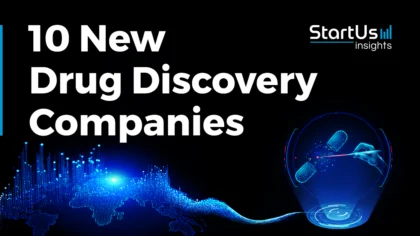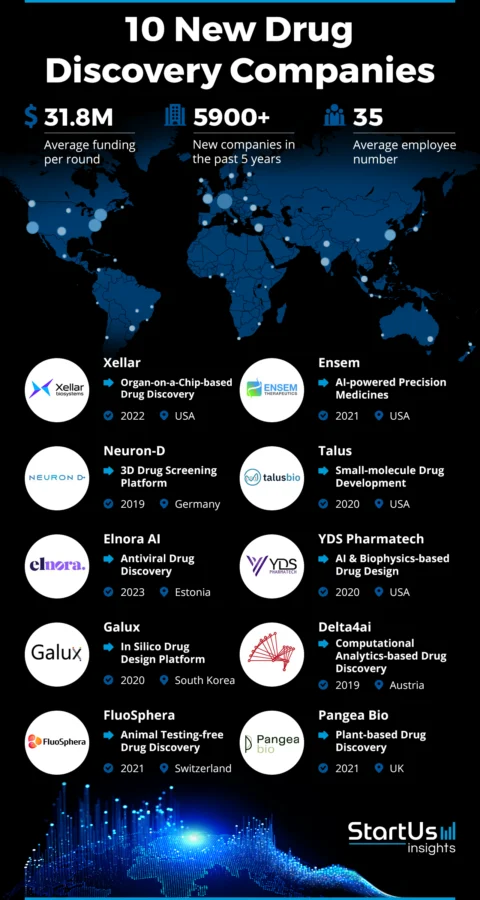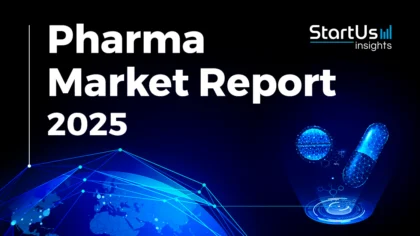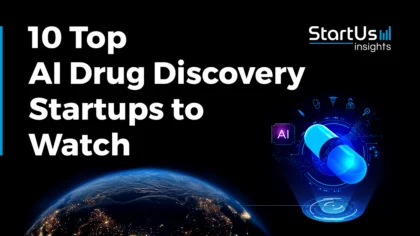New drug discovery companies are changing pharmaceutical research by leveraging AI, ML, and CRISPR-Cas9 to accelerate drug development. Developments in high-throughput screening, computational chemistry, and bioinformatics improve precision and efficiency, enabling RNA-based therapies and personalized medicine. These technologies streamline discovery, reduce costs, and improve treatment outcomes. Continue reading to gain up-to-date and data-driven insights on:
Key Takeaways
Drawing insights from the Big Data & AI-powered StartUs Insights Discovery Platform that provides data on over 4.7+ million emerging companies globally, we explore the evolving landscape of the drug discovery industry. This sector is marked by key trends and a substantial workforce, shaping its future. The last time we updated this report was in January 2025. If something is missing or off, your tips are welcome! Here are some key insights at a glance:
- Current Drug Discovery Trends: Some of the major trends advancing drug discovery are AI-powered drug discovery, small molecule drug development, in-silico drug design, animal testing-free drug discovery, and 3D drug screening.
- Drug Discovery Industry Statistics: The sector comprises 48K+ organizations worldwide. Out of these, 5.9K+ new drug discovery companies were founded in the last five years. On average, each of these organizations employs about 35 people and witnesses 2020 as the average founding year. Moreover, the average funding received by these 5.9K+ companies per round in the same span is USD 31.8 million.
- 10 New Drug Discovery Companies to Watch:
- Xellar – Organ-on-a-Chip-based Drug Discovery
- Neuron-D – 3D Drug Screening Platform
- Elnora AI – Antiviral Drug Discovery
- Galux – In Silico Drug Design Platform
- FluoSphera – Animal Testing-free Drug Discovery
- Ensem – AI-powered Precision Medicines
- Talus – Small-molecule Drug Development
- YDS Pharmatech – AI & Biophysics-based Drug Design
- Delta4ai – Computational Analytics-based Drug Discovery
- Pangea Bio – Plant-based Drug Discovery
Meet 10 out of 5.9K+ New Drug Discovery Companies
In this section, we spotlight 10 new drug discovery companies leveraging organ-on-a-chip, in silico drug design, small-molecule drug development, plant-based drug discovery, and much more. Organ-on-a-chip systems mimic human organ functions for precise drug testing. In silico drug, design platforms use computational models to streamline candidate identification. Small-molecule drug development focuses on creating potent, targeted therapies. Plant-based drug discovery explores botanical sources for novel compounds. These innovative approaches enhance accuracy, efficiency, and success rates in drug discovery. Read on to discover more about such tech-driven solutions these companies offer!
Note on Signal Strength
One of the unique metrics we feature for each company is Signal Strength, a proprietary data point generated by our Discovery Platform. It gauges the extent to which a company’s influence has permeated the global ecosystem of startups, scaleups, and emerging companies. This proprietary metric serves as a valuable guidepost for understanding a company’s standing in the broader market landscape.
1. Xellar
- Founding Year: 2022
- Employee Range: 11-50
- Location: USA
- Signal Strength: Very Strong
Xellar combines machine learning with large-scale lab experiments. It develops an organ chip culture system that mimics human organs using microfluidics.
This enables researchers to create human tissue/organ chip disease models that replicate the 3D architecture of real tissues, providing a more accurate representation of human biology.
The company’s high-throughput, high-content imaging platform captures biological details at the cellular and tissue level using confocal microscopy.
The platform quantifies cellular changes by employing image analysis algorithms to assess drug efficacy and discover biomarkers. Finally,
Xellar’s computation platform utilizes AI and machine learning to analyze complex biological data, extracting insights for drug response assessment, biomarker identification, and clinical outcome prediction.
2. Neuron-D
- Founding Year: 2019
- Employee Range: 2-10
- Location: Germany
- Signal Strength: Very Strong
Neuron-D develops 3D human brain models for drug discovery. It provides a more human-relevant platform for testing potential medications.
Its technology consists of a patented 3D hydrogel scaffold that mimics the complex architecture of various brain tissues. This bioengineered environment allows researchers to cultivate human neurons and glial cells, enabling them to study neurodegenerative diseases like Alzheimer’s and Taupathy.
It also models healthy brain development and even grows patient-derived glioblastoma tumors.
Further, Neuron-D’s platform enables customization, allowing researchers to tailor the 3D brain models to address specific research questions.
The company thus provides neuroscientists and pharmaceutical companies with a tool to accelerate drug development and gain deeper insights into neurological diseases.
3. Elnora AI
- Founding Year: 2023
- Employee Range: 2-10
- Location: Estonia
- Signal Strength: Medium Strong
- Funding: Secured USD 50K
Elnora AI advances antiviral drug discovery by targeting host cells and the human cells the virus infects, rather than the virus itself.
Its platform analyzes datasets of human cellular information and viral interactions, pinpointing potential cellular pathways crucial for viral infection and replication.
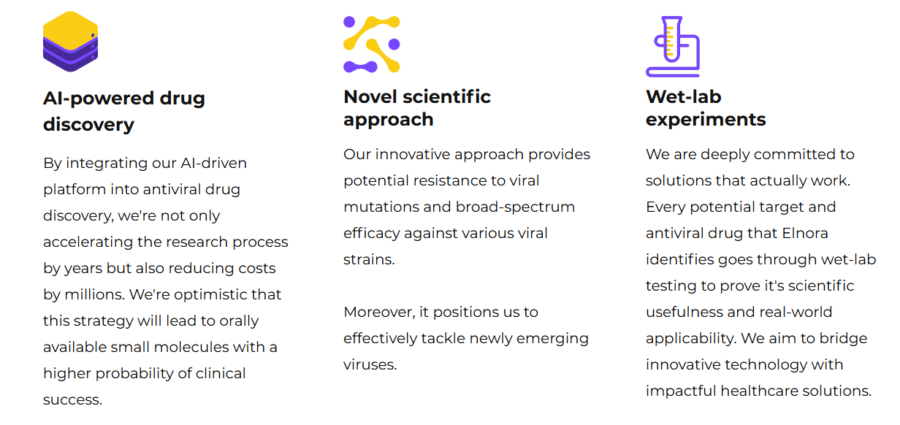
By targeting these pathways, Elnora AI identifies drug candidates that disrupt the virus’ life cycle within host cells. This offers an advantage drugs targeting host cell pathways are less likely to be rendered ineffective by mutations in the virus itself, a common challenge with traditional antiviral therapies.
The startup’s AI-powered platform thus presents a novel method for antiviral drug discovery, potentially leading to the development of more broadly effective and long-lasting antiviral treatments.
4. Galux
- Founding Year: 2020
- Employee Range: 11-50
- Location: South Korea
- Signal Strength: Very Strong
Galux tackles drug discovery with a two-pronged approach that integrates computational power and wet lab expertise.
Its in-silico platform, GALAXY, acts as a virtual laboratory, wielding physics, chemistry, and AI to design novel drug molecules that precisely target disease-causing proteins.
GALAXY employs advanced algorithms to simulate how these potential drugs bind to the proteins at the atomic level, predicting their efficacy and potential side effects.
Concurrently, Galux employs wet lab methods to validate these in-silico predictions. They utilize high-throughput cell-based assays to assess how the designed molecules function in real-world cellular environments.
This synergy between computational modeling and laboratory experimentation allows Galux to rapidly identify promising drug candidates while minimizing the risk of failure in later clinical trials.
5. FluoSphera
- Founding Year: 2021
- Employee Range: 2-10
- Location: Switzerland
- Signal Strength: Very Strong
- Funding: Grant Awarded USD 1 282 710
FluoSphera accelerates drug discovery with a microfluidic-based 3D cell culturing technology that eliminates the need for bulky chips.
Its platform utilizes micro-compartments to encapsulate various human cell types, mimicking the complex architecture and natural interactions found within human tissues.

The company’s technology allows researchers to study how potential drugs affect these 3D human cell cultures, providing a more accurate representation of how drugs behave in the body compared to traditional 2D cell cultures.
Additionally, FluoSphera’s approach offers the potential to reduce reliance on animal testing, promoting a more ethical and efficient path toward life-saving medications.
6. Ensem
- Founding Year: 2021
- Employee Range: 11-50
- Location: USA
- Signal Strength: Very Strong
Enseam tackles challenging drug discovery in oncology with its Kinetic Ensemble platform. This platform combines computational tools, deep learning, and advanced lab techniques to achieve two key feats identifying hidden binding sites (cryptic pockets) on proteins and designing drugs that precisely target these pockets.

Enseam’s process involves utilizing physics-based simulations to map protein movement and stability, alongside AI for predicting protein structures and potential drug interactions.
Biophysical technologies like X-ray crystallography then validate these findings. This unlocks new avenues for drug development, leading to faster creation of medicines for patients with limited treatment options.
7. Talus
- Founding Year: 2020
- Employee Range: 11-50
- Location: USA
- Signal Strength: Very Strong
- Funding: Secured USD 3 million
Talus works with transcription factors proteins that regulate gene expression and are linked to various diseases like cancer.
Its TF-Scan platform integrates three technologies functional proteomics for precise protein activity measurement, automated cell biology for high-throughput screening of drug candidates, and machine learning for intelligent data analysis.
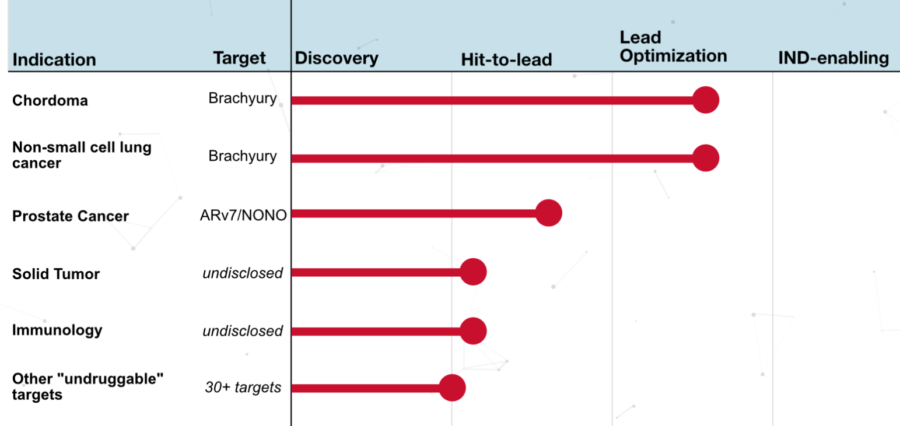
The combination allows TF-Scan to identify small molecule drugs that modulate transcription factor activity. By regulating these molecular switches, the company offers a new approach to drug discovery for cancers and other diseases driven by abnormal gene expression.
This benefits pharmaceutical companies seeking novel treatment options and patients with these conditions. Talus’ current pipeline focuses on rare and incurable childhood cancers, but the platform is working towards a broader range of diseases in the future.
8. YDS Pharmatech
- Founding Year: 2020
- Employee Range: 2-10
- Location: USA
- Signal Strength: Very Strong
YDS PharmaTech accelerates drug discovery through its proprietary MERES engine, a computational platform that harnesses the power of evolutionary AI, computational biophysics, and statistical mechanics.
MERES functions iteratively, mimicking a Darwinian selection process. It begins by analyzing a single known drug molecule. Then, through a cycle of modification, evaluation, reinforcement, evolution, and sampling (MERES), the platform generates a vast library of virtual offspring compounds.
MERES harnesses computational biophysics to assess the binding affinity of these virtual molecules to the target protein. Only the most promising candidates are selected for further refinement in the next cycle.
This iterative process allows MERES to rapidly identify drug candidates with significantly improved binding affinity, potentially up to 100 times stronger than the starting molecule.
By replacing traditional trial-and-error approaches, MERES offers pharmaceutical companies and researchers a faster and more efficient route to discovering entirely new classes of drugs.
Moreover, YDS Pharmatech partnered with N1 Life to co-develop a generative AI-driven peptide design platform.
9. Delta4ai
- Founding Year: 2019
- Employee Range: 2-10
- Location: Austria
- Signal Strength: Very Strong
Delta4ai repurposes existing drugs for new therapeutic uses. Its AI-powered platform, Hyper analyzes a vast dataset of drug-disease relationships.
It utilizes advanced algorithms to mine hidden connections between existing drugs and new disease targets based on their biological profiles. This enables researchers to identify potential new applications for approved drugs, significantly reducing the time and cost associated with traditional drug development.
Additionally, the company offers services to pharmaceutical companies and research institutions, leveraging Hyper-C to analyze their proprietary datasets and accelerate their drug discovery pipelines.
Thus, Delta4ai’s platform supports internal drug discovery efforts and collaborative partnerships, leading to the development of new treatment options for patients.
10. Pangea Bio
- Founding Year: 2021
- Employee Range: 11-50
- Location: UK
- Signal Strength: Very Strong
- Funding: Raised USD 15 million
Pangea Bio utilizes AI and natural product chemistry to discover novel drugs for neurological and neuropsychiatric disorders. Its platform, PangeaAI, integrates computational metabolomics and generative AI. This combination unlocks the therapeutic potential hidden within natural sources like plants and fungi.
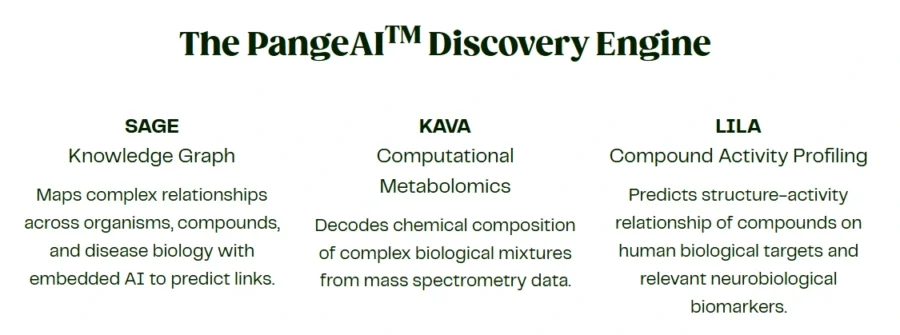
PangeaAI analyzes datasets of these natural products alongside human disease information to identify promising drug candidates with neuroactive properties. This leverages the inherent safety profile of natural compounds while using AI to expedite the discovery process.
Further, Pangea Bio prioritizes medicinally used plant species as starting points, increasing the likelihood of successful drug development through existing evidence of efficacy in humans.
PangeaAI thus advances drug discovery in the neurological space, benefiting researchers and pharmaceutical companies seeking innovative treatments for brain disorders.
Quick Tip to Find New Drug Discovery Companies
Utilizing a SaaS platform like the Discovery Platform for identifying new drug discovery companies provides significant benefits compared to traditional scouting methods:
- Increased Efficiency: The Discovery Platform offers advanced tools that streamline the scouting process. It replaces your hours of conventional desk research, saving time and resources in identifying drug discovery innovations.
- Access to Real-time Insights: Gain a competitive edge with up-to-date information on the latest trends in the drug discovery industry. The platform keeps you informed with near real-time updates on emerging drug discovery solutions and news, enabling you to make swift and informed decisions.
- Precise Scouting: Customize your search to focus on specific niches within the drug discovery sector, such as in-silico drug design platforms, animal testing-free drug discovery, or AI-powered precision medicines. The platform’s diverse filtering options allow you to target your scouting efforts precisely, ensuring that you find the most relevant and groundbreaking companies in the field.
Ready to Explore All New Drug Discovery Companies?
We’ve explored the dynamic landscape of the drug discovery industry, examining the latest trends and spotlighting exceptional companies driving innovation. To dive deeper, download our free Drug Development Report or schedule a demo of the Discovery Platform for a customized exploration of these groundbreaking developments.

